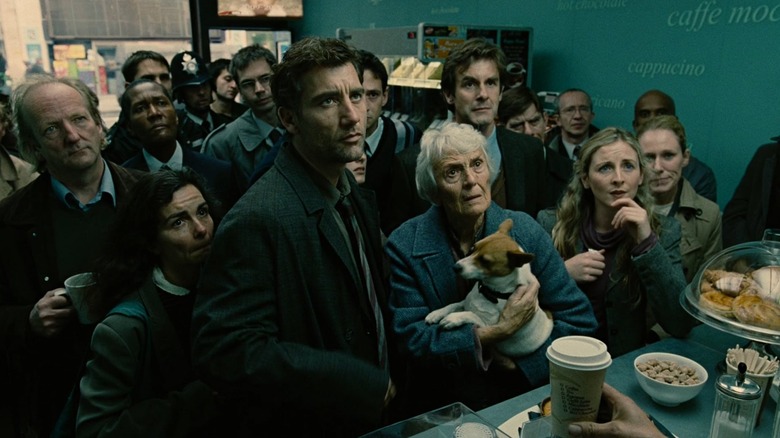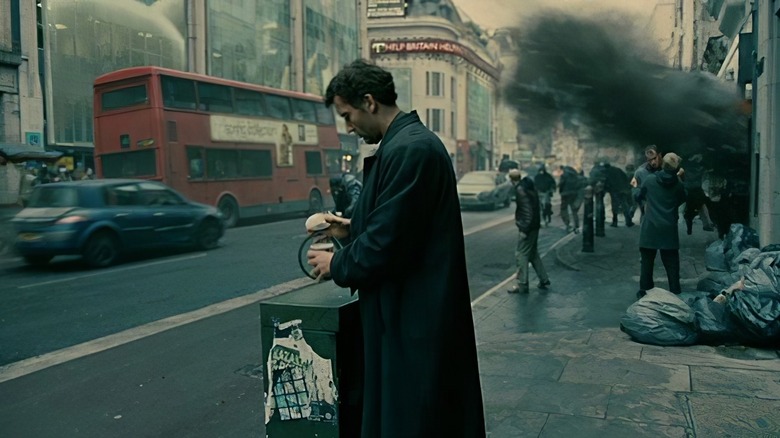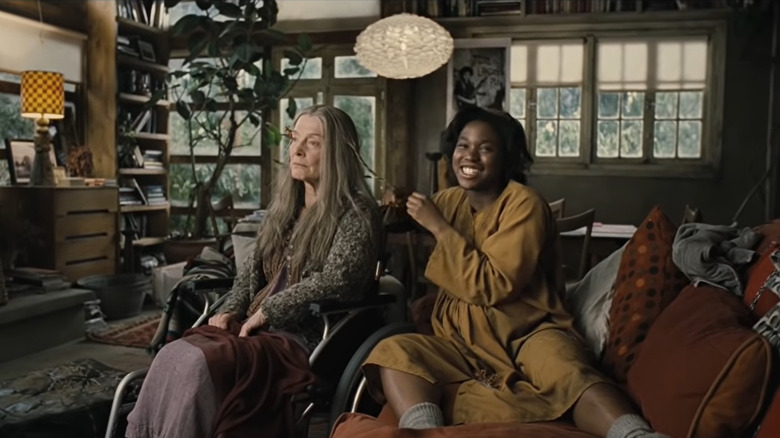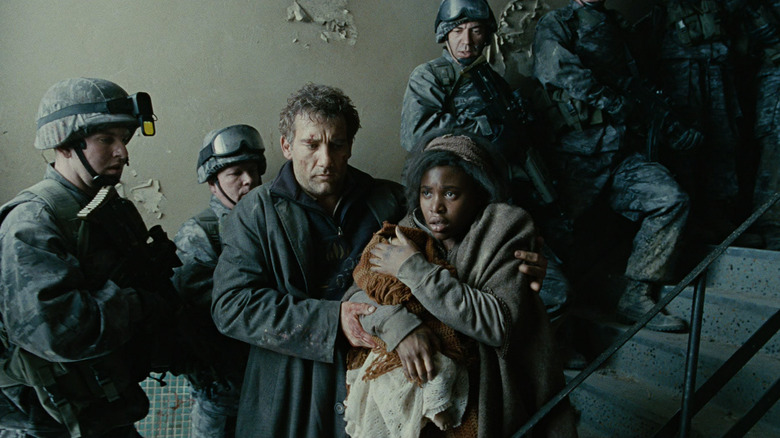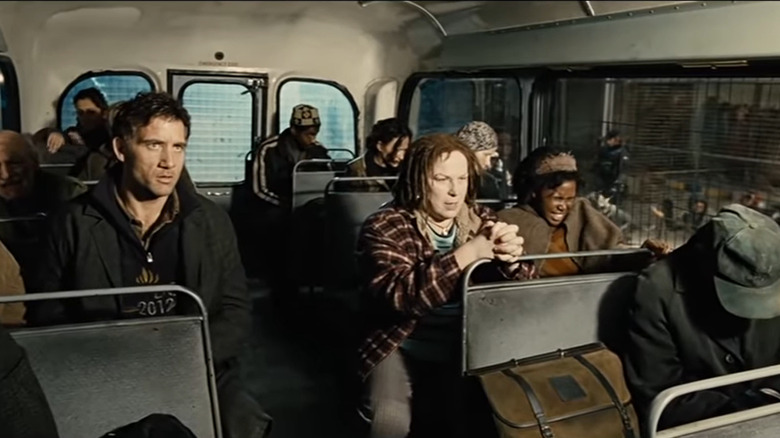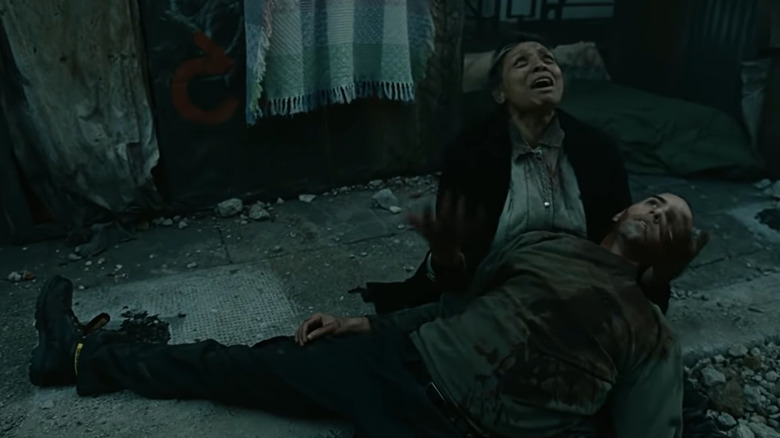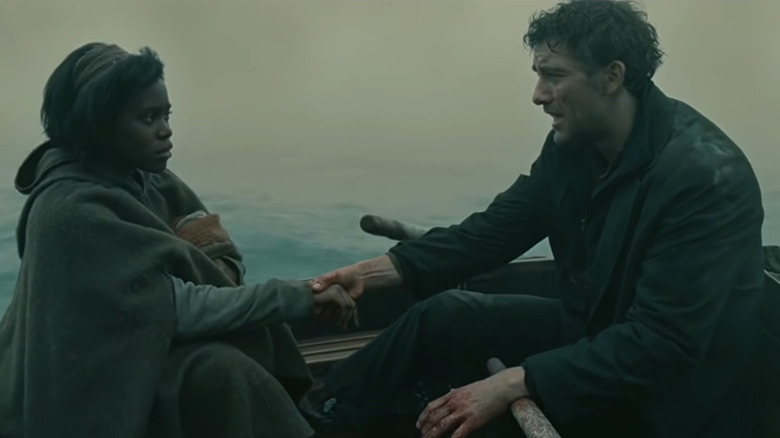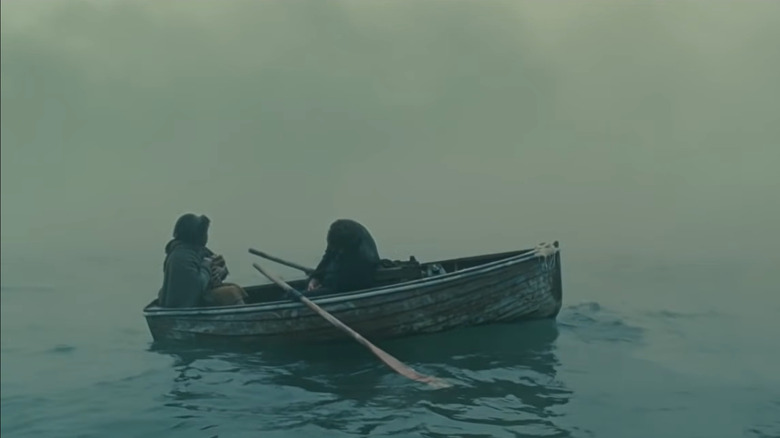Children Of Men Ending Explained: Finding A Worthy Cause
There are a lot of dystopian movies and TV shows out there about a gruff, cynical man forced to traverse great distances with a youngling who teaches him to care about things again, but "Children of Men" is definitely the best of the genre.
The 2006 dystopian action thriller starts off with a simple premise — not a single person has been born in over 18 years. With some help from the novel it's based on (but not too much help), the movie builds a fleshed-out, lived-in world out of this idea. From the empty schoolyards to the fact that Kee (Clare-Hope Ashitey) takes far longer than usual to even realize she's pregnant in the first place, every little ripple effect this change would have on the world seems fully accounted for.
And unlike many movies of its nature, one really gets the sense that the rest of this world keeps moving when the camera's not on it. It feels like every single minor character, no matter how small their role, has an entire movie's worth of struggles they're dealing with that we'll simply never get to see. The script sticks to Theo Faron (Clive Owen) on his personal journey, but the camera constantly lingers on the struggles of everyone around him. It's a directing choice — by the brilliant Alfonso Cuarón ("Roma," "Gravity") — that heightens the themes the movie already has, and it makes the ending of the film hit all the harder.
A world that only reinforces Theo's flaws
"Children of Men" opens in a London café where the customers are crowded around the TV, watching a news report about the death of 'Baby' Diego Ricardo, the last person to be born before the infertility epidemic fully took over. Everyone in the shop is devastated — even though Diego hasn't done anything remarkable with his life, his mere existence was a symbol of the youth the world's been slowly losing, day by day.
Theo doesn't care though. He comes in, gets his coffee, and walks out with barely a glance at the TV. It might seem cold, but it's also the very thing that saves his life. No more than 30 seconds after he leaves the café, pausing to pour some liquor into his coffee, the shop explodes. Not only is this an effective bit of worldbuilding — establishing without words that this is the sort of society where senseless killings can happen at any moment — but it also makes a compelling argument in favor of apathy. Theo doesn't care about anything, so he gets to live another day.
Even beyond sheer survival, Theo's apathy is an understandable coping mechanism for the world around him. He lost his only son in a flu pandemic. He can't walk down the street without seeing or hearing some sort of human rights abuse or extreme human suffering. There's not much Theo can do for any of these people individually, let alone all of them. Can you really blame him for tuning it all out? His attitude is just a slightly more dramatic version of what people do today on a daily basis. It's the in-person equivalent of seeing a tragic news story on your Twitter feed and scrolling right past it.
Kee is the key
The first third of "Children of Men" is dedicated to dragging Theo out of his depression a tiny bit at a time. His ex-wife Julian Taylor (Julianne Moore) has to offer Theo a lot of money just to agree to a seemingly low-stakes mission escorting Kee to Canterbury. When Julian is shot to death in front of him, it serves as further proof that he was right all along. Getting involved in any sort of serious cause in this world is not worth the trouble.
But then he figures out the true nature of the mission: Kee is pregnant. Little by little, we get to see what Theo was truly like back when he was young and in love with Julian, and how kind and supportive he was capable of being before the world squeezed all of that out of him. Theo doesn't just repeatedly risk his life to keep Kee safe — the movie quietly treats us to moment after moment of him engaging in unflinching, thoughtless acts of selflessness, done without any expectation of thanks or reward.
When they get separated at the refugee camp, Theo is forced by a soldier to give away his expensive watch, and he does it immediately. Theo's a smoker, but he trades away his pack of cigarettes to guarantee Kee a private room for the night without a moment's hesitation. Theo's an alcoholic, but he uses the last of his liquor to wash his hands before helping Kee give birth. Even when he's shot near the end — an injury that would soon prove fatal — he barely even notices or cares. He's all in on protecting Kee and her child and continues doing so until he's physically unable to.
Much-needed moments of warmth
None of these are particularly flashy or impressive moments — in a way, this is the bare minimum you'd expect from a man who's the only protector for a woman in a vulnerable position — but there's something deeply moving about the way this previous uncaring man quietly, consistently looks after Kee, in a manner that feels second nature to him. The world of "Children of Men" is deeply cruel and callous almost all the way through, but Theo isn't.
Neither is everyone else, for that matter, once they can hear and see the baby for themselves. This leads to perhaps the most powerful moment in the movie — the scene where the soldiers see the baby and immediately stop firing. These are soldiers fighting on behalf of a deeply authoritarian government, who've been characterized as unflinchingly violent this whole film. And even they turn peaceful the moment they realize there's an infant nearby.
Yet once Theo and Kee are out of range of the building where all the fighting is going on, the war starts again. It's like someone flicked a switch, and the battle's back on as if the ceasefire never happened. Odds are, all the people in that building we saw fawning over the baby died soon after, and there's a good chance a lot of the soldiers did too. But as always, the camera stays focused on Theo and Kee. We only learn about the larger world of "Children of Men" as long as our principal characters are still in that environment.
Sometimes the horror's in the implication
Different variations of that war scene happen across the film, as both major and minor characters are left behind in ways that seem almost designed to give us as little closure as possible. Most movies would follow up or drop a hint as to what happened to Miriam (Pam Ferris), who's dragged off the bus by soldiers and has a bag forced over her head. Most movies would've given us some sort of definitive ending to a character who had been a vital part of the story.
But in "Children of Men," we're left to imagine what happens to her. On one hand, this can be seen as a kindness on the movie's part — we probably don't really want to see what happens to Miriam, after all. But on the other hand, the implication of what happens to her is even more chilling than if they had just straightforwardly shown it all to us.
A similar thing happens with Marichka (Oana Pellea), the woman who serves as a huge help to Theo and Kee in the refugee camp. Theo pleads with her to get on the boat with them, but she chooses to stay in the camp. We never find out what happens to her — her survival odds seem higher than Miriam's at least, but it doesn't look good. So much of this person's life — past and future — is a total mystery to us, and we just have to accept that we'll never get to know about any of it.
A chaotic world feels slightly more bearable
In the beginning, the camera's constant lingering on the suffering of others, before abandoning them forever, felt like a commentary on Theo's apathetic worldview. But as the stakes for Theo and Kee get higher in "Children of Men," the point the movie makes with its camerawork shifts. Whether the camera is peering out a bus's window or lingering on a mother mourning her dead son in an homage to Michelangelo's Pietà, it feels more like it's paying its respects. There's no longer any commentary on whether Theo could be doing anything to help these people because we know he's focused on the most important mission of all. For everyone else, all he — and we — can truly do is wish them well.
The shift here is like the shift that happens in the real world when you find a cause you can actively support in a clear, tangible way. As they browse through news stories and social media posts about horrible things happening around the world, most people feel a combination of guilt, depression, or anxiety. The easier option is to simply shut all that stuff out and not think about it because, otherwise, the question of "What am I doing to help?" becomes unbearable. But as we see with Theo, it gets a little more bearable once you discover and start fighting for a cause you believe in.
Finding direction in a directionless world
Theo may not be able to save the hundreds of people he passes by in this blood-soaked film, but he can save one of them — and that's what counts. It's like that episode of "Doctor Who" where the Doctor is forced by the rules of time to let the whole village of Pompeii be destroyed by the infamous volcanic eruption. In the end, the Doctor's companion Donna successfully convinces him to save at least one person. "Not the whole town," she pleads. "Just save someone."
There's an important message in there. If you're worried about the state of the world and all the things you aren't doing to help, you've to remember that nobody's expecting you to dedicate all your spare time to fixing every single societal ill. It's best to find one or two causes that mean a lot to you and focus on them. You can't fix everything but you can fix something, and as long as you're doing at least one thing, you're making the world a better place.
At the start of "Children of Men," Theo is inert and depressed because of how unfixable everything in the world feels. Because everything is a mess, he's given up entirely. That never truly changes — the world is still in shambles by the end. Even if the infertility plague is no more as the film's ending hints, it would still take a couple of generations before things would even come close to returning to normalcy. But Theo has found his one cause, and that's all he needs.
A hopeful ending, if not a happy one
On paper, the ending to "Children of Men" is a downer. Nearly every character Theo and Kee interact with across the film is either dead or presumed dead. As Kee spots and waits for the approaching ship that belongs to the Human Project, there's no telling how she will be treated once she's on board. Will she be experimented upon? Perhaps most crushing of all is the reveal that Theo's been shot. By the end of the movie, he's fully unconscious, and it seems unlikely that the people on the ship will be able to save him in time.
But the background music, the imagery of the ship, and the sound of children's laughter over the end credits all seem to point to the idea that things will turn out alright — in the grand scheme of things. Even if Theo is in fact dead, he's died a hero — he got Kee past the most dangerous part of her journey. Theo has spent the last of his time on Earth performing a major, undeniably good deed on behalf of both Kee and the world.
When we met him, he was a withdrawn shell of his former self, but he rediscovered himself when it mattered most. After years of tragedy, suffering, and hopelessness, Theo finally found a cause worth living and giving his life for.
